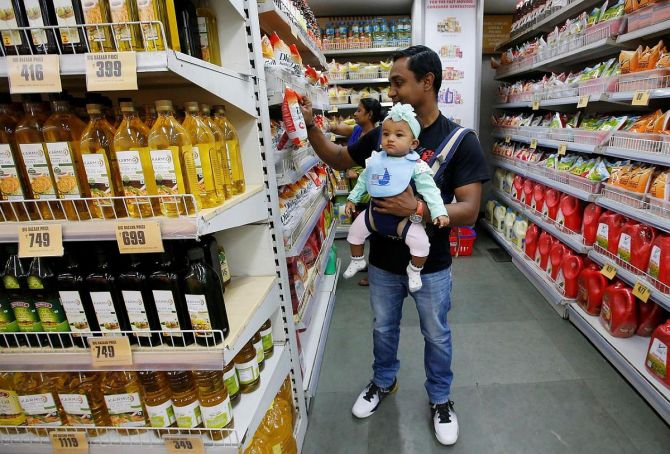The bigger threat for DMart is that the Reliance-Future combine now has grocery revenues that are nearly 2.5 times of it, putting pressure on the former to improve stickiness of its consumers.

Avenue Supermarts, which runs the DMart chain of stores in India, is now a distant number two after the coming together of Reliance Retail and Future group in a nearly Rs 25,000-crore transaction.
The combine now has a third of the organised retail market in India.
But the bigger threat for DMart is that the Reliance-Future combine now has grocery revenues that are nearly 2.5 times of it, putting pressure on the former to improve stickiness of its consumers.
"Retaining loyalty will be key in a market where the largest player has become even larger," says Devangshu Dutta, chief executive officer of retail consultancy Third Eyesight.
DMart, say experts, may offer steeper discounts on its food and grocery products and increase the number of stock-keeping units to offer more choice to consumers, as it seeks to respond to the combine's efficiencies of scale.
However, a crucial strategic shift would be to build more pockets of strength, beyond the western region, where it is traditionally known.
While DMart has 216 stores in over 12 states, over a third of them are in Maharashtra alone.
Of these, 32 are in the Mumbai region.
Experts say that DMart may have to shed its conservative nature and build a loyal base in other metropolitan cities too, if it wishes to hedge itself from the risk of competitive intensity in Mumbai, where the Reliance-Future combine will have 39 stores.
In a recent call with analysts, Neville Noronha, managing director and chief executive officer, Avenue Supermarts, said that the company had been accelerating the pace of its store launches over the last two years, which would continue into the future.
In FY20, 38 DMart stores were added, while the year before, the number was 21.
In the first quarter of FY21, stores added were only two, though the size of these outlets were larger than previous DMart stores.
Abneesh Roy, executive vice-president (research), Edelweiss Securities, says, "Improving geographical spread could be one way of tackling a very large retail player such as Reliance.
"DMart is adding stores in new cities and will improve this pace in the future.
"But, I do believe that there is room for growth for DMart in existing markets, since the share of organised retail within total retail in the country is still small.
"Both DMart and Reliance can comfortably grow as a result."
Industry estimates peg the size of India's total retail market at $700 billion.
Around 15 per cent of this market is organised, while 85 per cent is unorganised, increasing prospects for most organised retailers including DMart and Reliance, say some retail experts.
Yet, as Arnab Mitra and Pratik Rangnekar, analysts at brokerage Credit Suisse, have argued in their recent report that the road ahead will still not be easy for DMart, since Reliance would negotiate better terms of trade and promotional support from companies, pushing DMart into a spot.
"The consolidation of Future and Reliance is a negative for Avenue, since competitive intensity will increase," Mitra and Rangnekar said.
Credit Suisse says that the contribution of Reliance Retail to the topline of a fast-moving consumer goods company (FMCG) before the Future deal was around 6 per cent, which has now increased to 9 per cent following the acquisition.
DMart, on the other hand, contributes just four per cent to the sales of an FMCG company, which is not expected to change in the foreseeable future.
Photograph: Rupak De Chowdhury/Reuters











